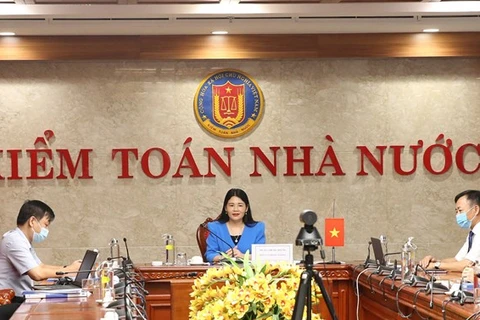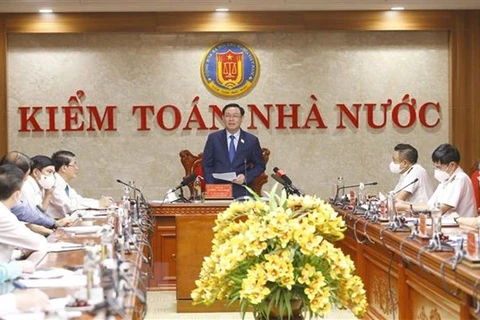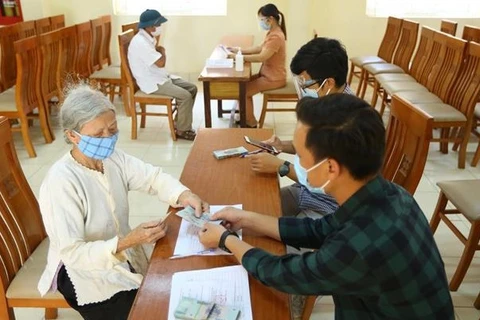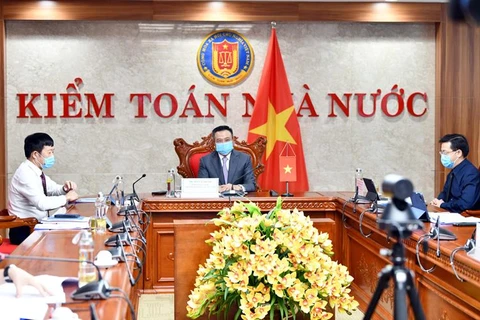 The State Audit Office of Vietnam (SAV) has detected a number of loopholes in the management and use of State capital and assets at enterprises (Photo: congthuong.vn)
The State Audit Office of Vietnam (SAV) has detected a number of loopholes in the management and use of State capital and assets at enterprises (Photo: congthuong.vn) In its report on outcomes of audits in 2020, the SAV said it had conducted audits of financial reports and activities related to the management and use of State capital in the previous year of 160 firms under 17 groups and corporations.
Most of them committed mistakes in accounting and performing financial obligations to the State budget. Therefore, following the audits, they had to make adjustments to assets, capital, revenues and costs. As a result, an additional 1.03 trillion VND (45.2 million USD) was collected for the State budget.
According to the report, numerous units have not yet issued financial management regulations, such as PVPower and PVOIL Phu Tho.
Ineffective management of cash flow remains in many units, the SAV said.
In addition, irresponsibility was found in debt management in many companies, resulting in overdue and bad debts. Even though the construction of a number of real estate projects have been completed, they have yet to be put into operation and thus reducing the efficiency of capital use.
Some investment projects have been postponed and lagged behind schedule for years. A typical example is a project to develop infrastructure in the Yen Hoa urban area in Cau Giay district of Hanoi has expired for more than 16 years but its licence has not been renewed. There are also many others which have been behind schedule for up to 10 years.
The SAV report also pointed out that some investment units recorded low operation results or even huge losses.
The SAV also found many businesses have made ineffective investment, resulting in very low profit or losses. Others used land for wrong purposes and after the SAV re-evaluated land rental and taxes, many firms had to pay additional land lease fees.
Furthermore, sluggish and inappropriate investment capital disbursement was reported in many companies.
The SAV has asked the Prime Minister to order ministries, centrally-run agencies, localities and units to review and impose fines onto those who were responsible for the wrongdoings.
So far this year, the SAV has completed 91 audits and proposed financial measures related to 50.87 trillion VND, including collecting an additional 6.65 trillion VND for the State budget and reducing budget spending by 5.79 trillion VND.
The agency also proposed scrapping, amending, supplementing and issuing 67 legal documents, helping to deal with loopholes in mechanisms and policies to prevent losses and wastefulness, he said.
It will strive to conduct annual audits of budget balances of 80 percent of ministries and centrally-run agencies and localities, and biennial audits for the remaining 20 percent, Auditor General Tran Sy Thanh has said.
Regarding the development orientations of the SAV in the following five years, Thanh said that the agency will diversify the types of audit.
The SAV is to develop into the main tool of the State which will prove effective in the inspection for the management and use of public funding and assets, as well as anti-corruption and anti-wastefulness.
The office is also expected to timely provide information serving activities of the National Assembly, the State, ministries, sectors and localities.
To realise the targets, the audit office has identified a number of key tasks to improve its role in corruption prevention and combat, and fostering thrift practice and anti-wastefulness, he added.
It will bolster audit activities in the fields of environment, climate change adaptation, complete the legal system in the relevant field and the auditing sector's organisational structure, and improve the quality of human resources.
The SAV is serving as Chair of the ASEAN Supreme Audit Institutions (ASEANSAI) Strategic Planning Committee and Chair of the Asian Organisation of Supreme Audit Institutions (ASOSAI) in the 2018 - 2021 term./.
VNA























